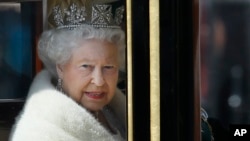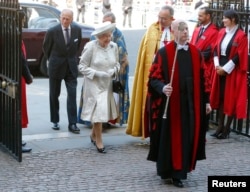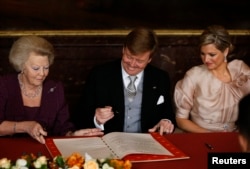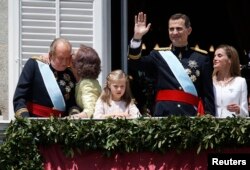After 63 years on the throne, Queen Elizabeth next month becomes Britain's longest-ruling monarch but there is little prospect of her stepping aside, as other aging European crowned heads have done, in favor of her son, Charles.
Those close to Elizabeth — who on Sept. 9 takes the long-service record from her great-great-grandmother Queen Victoria — say the 89-year-old has no intention of succumbing to the European fashion for abdication.
That means Prince Charles, 66, already a record-holder himself as Britain's longest-serving heir apparent, will have to wait longer still until he becomes king.
"I declare before you all that my whole life, whether it be long or short, shall be devoted to your service and the service of our great imperial family," Elizabeth said in a 21st birthday broadcast to the nation in 1947.
The milestone of overtaking Victoria has already prompted speculation as to whether Elizabeth might step aside.
When asked if abdication were a possibility, a senior palace source told Reuters: "Life means life."
The religious overtones to a British coronation are deeply symbolic for Elizabeth, who as queen is Supreme Governor of the Church of England.
"The queen won't abdicate, she must not abdicate, there's absolutely no reason for her to abdicate and indeed constitutionally and religiously she cannot abdicate: she is an anointed queen," royal historian Hugo Vickers told Reuters.
Margaret Rhodes, the queen's cousin and a friend since childhood, believes she will never break her commitment to the nation.
"The vows that she made on coronation day are something so deep and so special that she would not consider not continuing to fulfil those vows until the day she dies," Rhodes told the BBC in 2006.
The abdication in 1936 of the queen's uncle Edward VIII - for reasons of love rather than old age - proved traumatic enough, plunging the monarchy into a constitutional crisis that put her reluctant father on the throne.
In the Netherlands and Spain, long-standing monarchs have in recent years given up their thrones saying they needed to pass on the mantle to a younger generation.
‘Life means life’
The Dutch Queen Beatrix announced shortly before her 75th birthday in January 2013 that she would abdicate in favor of her son Willem-Alexander.
"I am not stepping down because the tasks of the function are too great, but out of the conviction that the responsibilities of our country should be passed on to a new generation," she said.
In June last year, Spain's once popular King Juan Carlos abdicated at the age of 76 in favor of his son Felipe after a series of corruption scandals in the royal family.
"A new generation is quite rightly demanding to take the lead role," he said.
In Britain, though, there is little demand for Elizabeth to go, nor any clamor for Charles to be king. If anything, the opposite may be true.
Charles, who has been groomed from birth to one day be king, is less popular than his mother: In a poll in April, 53 percent said they liked him compared to 77 percent who liked the Queen.
Only 19 percent of Britons wanted a republic, compared to 70 percent who supported the monarchy.
Even keen republicans such as Labor member of parliament Paul Flynn say the monarchy is safe while Elizabeth remains on the throne but question its future under Charles.
"This one, I've come to terms with, it will be delayed for little while. It is questionable whether the most likely end of the monarchy will come with Charles," Flynn told Reuters.
King Charles?
In contrast to the strict political neutrality observed by Elizabeth, Charles has spoken out about issues from the destruction of historical buildings to organic farming and Vladimir Putin's annexation of Ukraine.
Critics said letters Charles had written to ministers, some of which were published in May against the wishes of the government and royal family, showed a desire to meddle in everything from the supply of equipment for British troops fighting in Iraq to the fate of the Patagonian Toothfish.
Supporters said the letters showed Charles was speaking up on issues Britons cared about.
Professor Philip Murphy, director of the Institute of Commonwealth Studies and an expert on the monarchy, said Charles's view of himself as a "spokesperson for the common man" was dangerous.
"The public may not tolerate that for very long and certainly political leaders might not," he told Reuters.
Some commentators have suggested that only serious illness could prompt Elizabeth to hand over to Charles, particularly if she were to lose her 94-year-old husband Prince Philip, although even then a regency is thought more likely.
"I don't think abdication is entirely off the cards," royal biographer Robert Lacey told Reuters.
Skip a generation?
Some, like Flynn, suggest on the death of the queen there should not only be a referendum on the monarchy but also on whether the crown should pass to Charles's son Prince William, who is 33.
"I think it would be a popular choice to have a referendum on skipping a generation," said Flynn who dismissed the current system for head of state as "first past the bed post."
Prince William and Prince Harry, the children of Charles and Princess Diana, his first wife who died in a Paris car crash in 1997, are the most popular members of the family, liked by 79 percent of the British public.
Murphy said for many Britons, there were plenty of more pressing concerns than reform of the monarchy.
"There's a sense of if it ain't broke, don't fix it," he said.
As it stands, republicans or those wanting constitutional change, will have a long wait. Asked in 2012 whether the queen should abdicate or if the throne should skip a generation, Prime Minister David Cameron replied: "I think both those things are out of the question."










